Avira Prime doesn’t quite have the power of some of the top security suites, but it’s still a very capable package with above average protection, an unlimited VPN and loads of bonus tools.
Pros
- +
Easy-to-use interface
- +
Unlimited VPN
- +
Huge number of features
- +
Windows, Mac, Android and iOS apps
- +
Above-average lab test results
- +
Minimal performance impact
- +
Low prices
- +
Quick scans are speedy and comprehensive
- +
Outstanding Windows speedup tool
Cons
- –
Support responses can take a very long time
- –
Slow VPN
- –
No desktop webcam or microphone protection
- –
Many tools are a little basic
Why you can trust TechRadar We spend hours testing every product or service we review, so you can be sure you’re buying the best. Find out more about how we test.
Avira Prime is a feature-packed security suite which includes full antivirus and web protection for mobiles and desktops, an unlimited VPN, a password manager and some of the most comprehensive Windows speedup tools we’ve seen.
It doesn’t quite have all the bonus tools we see elsewhere – there’s no webcam protection, parental control or cloud backup, for instance – but there’s a lot to like here. If you’re an Avira fan, or you need effective cleanup features, or you’re just in the market for a new security suite, it’s well worth checking out.

Avira Prime: Pricing
Avira Prime may have a very long feature list, but its prices are surprisingly low. You can cover up to five Windows, Mac, Android or iOS devices for only $59.99 in year one, $104.99 on renewal. There’s a generous 60-day money-back guarantee for subscriptions of one or more years.
To put that in perspective, Bitdefender Premium Security has a similar feature set to Prime with a full VPN and a password manager. It covers up to ten devices, but is priced significantly higher at $79.99 in year one, $159.99 on renewal.
If price is a priority, look at Norton 360 Deluxe, too. It has a full VPN and a password manager, but also adds parental controls and 50GB cloud backup, and covers up to five desktop and mobile devices for $49.99 in year one, $119.99 on renewal.
If these figures feel uncomfortably high, remember they all include an unlimited VPN, and that’s worth a lot. Sign up for even the most basic one-year NordVPN account and you’ll pay $68.25 in year one (with three free months), $112.35 on renewal. The antivirus VPNs aren’t a patch on NordVPN, but if you only need the basics, Avira’s offering could be a great value option.
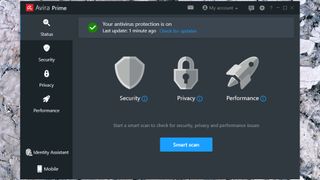
Avira Prime: Getting started
Like many competitors, Avira’s apps can be mostly installed from the company’s web dashboard. We found our subscription, clicked Install, chose ‘This Device’ and the Windows installer downloaded.
Setup was easy and largely automatic. Avira Prime ran its Smart Scan at the end of the process to look for malware and other issues, and we were done. The whole process took around five minutes and didn’t require any special security or technical knowledge.
Avira’s interface looks fairly conventional at first glance. A left-hand sidebar has icons for function types like Status, Security, Privacy and Performance); tapping any of these displays tiles for specific types of task (‘Virus Scans’, ‘Firewall’ and so on), and choosing one of these displays details on what you can do. It’s all very straightforward, but there are also lots of usability benefits built in.
The app uses a lot of icons, for instance, but they’re not the tiny cryptic images that you sometimes see elsewhere: they’re large, and usually have clear text captions. We were always clear on which tile did what.
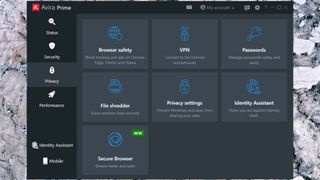
Navigation is simple. If we chose a function by mistake, there were generally at least three ways we could go back or look at something else. We found it easy to explore, and difficult to get lost.
The interface uses a regular window, too, which means you can resize it, minimize and maximize it and everything works exactly as you’d expect.
Even some of the menu options stand out from the crowd. How much time do you waste with some companies, trying to find out how to cancel a subscription or ask for a refund? Avira doesn’t hide these, it puts them up-front: ‘Renewal settings’ and ‘Cancel and ask for a refund’ options are only one click away.
Overall, Avira’s interface is a usability success story. It kept any navigation frustrations to a minimum, giving us more time to sample the app’s many interesting features.
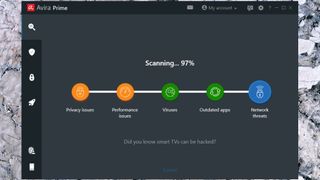
Avira Prime: Antivirus Scanning
Avira’s scanning options begin with its Smart Scan, a speedy all-in–one option which runs a quick check for malware, but also looks for network security issues, identifies missing software updates, identifies dubious privacy settings, and lists assorted performance issues (junk files, slow startup apps and more.)
Despite covering all this ground, Smart Scans ran quickly on our test system, completing in an average 50 seconds. That’s significantly faster than the quick scans of Avast (23 minutes) and Bitdefender (7-8 minutes) on the same system, and even beat the generally speedy Norton (1: 54 seconds.)
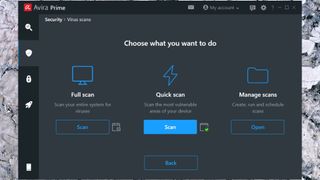
Other options include Quick Scans to check the most likely infected areas, or a Full Scan to crawl your entire system. A handy Custom Scan allows you to set up a scan with your own choice of files and folders – Documents and Downloads, say – and you can even schedule scans to run automatically when you’re not around.
We measure targeted scan speeds by pointing an antivirus at 50GB+ of test executables. Avira got off to a great start, completing the scan in 26: 30, significantly ahead of Bitdefender (37: 44), Avast (35: 40) and Norton (32: 01.)
But Bitdefender and Norton are better optimized, only scanning new and changed files by default. While their second scans dropped to 30 seconds (Bitdefender) and 3: 48 (Norton), Avira’s scan time remained relatively high at 23: 36.
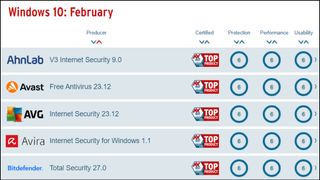
Avira Prime: Antivirus lab test results
Although we put every antivirus app we review through our own series of tests, we also pay close attention to results from the big antivirus testing labs.
We follow nine tests from labs including AV-Comparatives (Real-World Protection, Malware Protection, Android, Anti-Phishing, Performance), AV-Test (Windows, Android), MRG Effitas (360° Protection Testing) and SE Labs (Endpoint Security Home).
Each test has its own scoring system, making it tricky to compare performance. To address this, we use a special algorithm which (as long as an app is in at least five tests) converts the various results into a single summary score from zero to 10 representing the vendor’s overall rating.
Avira scored a decent 9.96, earning it an excellent fourth place out of 12 contenders, just behind Avast (9.98), Bitdefender (9.97) and F-Secure (9.97.)
Looking at the individual scores, Avira lagged a little behind the competition in some areas. It came bottom of the Anti-Phishing test, for instance (though that only had six contenders), and didn’t achieve the 100% Android protection results we expect from the very best apps.
Keep in mind that the differences between providers are tiny, though – often just one or two threats missed out of thousands – and Avira does score maximum protection marks in some tests (MRG Effitas, AV-Test Windows.) It may not quite offer market-leading performance, but Avira still delivers above-average protection which does a great deal to keep you safe from threats.
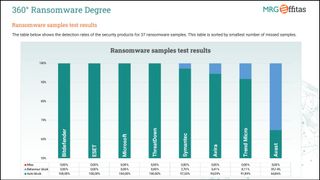
Avira Prime: Anti-ransomware
Ransomware remains one of the most deadly threats around, and it’s easy to see why. With the Akira ransomware family alone reportedly making $42 million in under a year, there are huge profits to be made. Even if you’re not a big business, it’s easy to get caught in the crossfire: you need strong protection.
We test antivirus ransomware performance by pitting each provider against our own custom ransomware sample. This is very basic, but it’s still capable of trashing an entire drive,, and because it’s never been released, an antivirus won’t be able to detect the threat from its file signature alone.
The results were disappointing, with Avira ignoring our ransomware and simply watching as it encrypted gigabytes of test files. That’s a surprise, not least because when we scanned our ransomware manually (right-click in Explorer, ‘Scan selected files with Explorer’), Avira did recognize that it was a threat.
There’s better news in MRG Effitas’ 360° Assessment, which tests vendor performance against 37 ransomware variants. Avira didn’t immediately detect all the files, but its behavior monitoring layer helped identify and stop the more stealthy threats, and it successfully protected against every test sample.
This isn’t quite the triumph it sounds because only a few other vendors took the test (Avast, Bitdefender, ESET, Microsoft, Norton, ThreatDown, Trend Micro), and they all passed, too. Still, it’s reassuring to know that Avira can stop both known and brand new malware via its behavior monitoring technology.
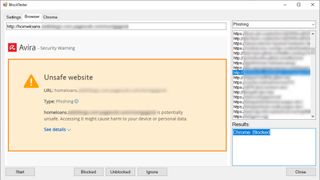
Avira Prime: Anti-phishing
Top-notch antivirus protection isn’t just about detecting threats as they arrive: they’ll prevent you from reaching them in the first place. That’s why we’re particularly interested in a vendor’s ability to keep you away from phishing and other malicious sites.
AV-Comparatives carries out a small annual antiphishing test, and the results weren’t great. Avira came last, blocking only 88% of test sites, and was beaten by ESET (92%), AVG (94%), Avast (94%) and Bitdefender (96%.)
(While coming last isn’t good news, it’s worth remembering that only six providers had the courage to put themselves up for anti-phishing tests. It’s entirely possible that other vendors are staying well away from that test because they know they’d score far worse than Avira.)
Avira did better in our own test, blocking every one of 100 shiny new phishing URLs. That’s a great performance, beating Avast (99%), Bitdefender (96%) and Norton (95%.)
When our results don’t match the latest from the labs, we tend to give the lab reports priority, as they’re based on larger tests. But even if Avira can’t quite match the best of the rest for anti-phishing, any difference is small, and it will still protect you from the vast majority of the dangers out there.
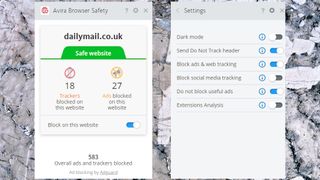
Avira Prime: Browser Safety
Avira’s Browser Safety is a Chrome, Firefox, Edge and Opera extension to block ads and trackers, and highlight malicious websites in your search results.
Although Browser Safety is highlighted as a feature in Avira’s paid products, it’s actually available for free, no need to install other Avira software or part with any cash.
The extension uses very capable AdGuard technology underneath, and achieved a decent 90% and 91% in our two ad-blocking tests. That’s better than many, although there are even more effective solutions around. For example, uBlock Origin scores 96% and 99% in the same tests, and it’s also available for free, no registration required.
Avira says Browser Safety highlights infected sites in your search engine results, but this didn’t happen on our test system. We visited the Support Site hoping for more information on the extension and how it worked, but the key article was a horribly brief 130 words and said little more than ‘click Privacy > Browser Safety and install it from your app store.’
The issue could be down to a lack of updates, as the extension’s last release was 18 months prior to the review. Okay, Avira makes Browser Safety free for everyone, so we’re not expecting new features every week. But when it’s also advertised as a feature of paid products like Avira Prime, we do expect more updates and web documentation than Browser Safety is currently getting.

Avira Prime: Performance impact
Antivirus has a reputation for slowing down your devices, so we check multiple test reports (and run in-depth checks of our own) to separate the overweight offerings from the speed leaders.
Avira excelled in AV-Comparatives’ last Performance Test, coming second only to ESET for its absolutely minimal performance impact (Avast came 5th, Bitdefender 6th and Norton 8th.)
AV-Test includes performance as a part of its regular device tests. As we write, it also rates Avira very highly, awarding the company a maximum 6/6 for its lightweight design.
We ran the top benchmark PCMark 10 on a test laptop, both before and after installing Avira. The results (4,566 before, 4,579 afterwards) suggested that Avira may have fractionally improved speeds rather than slowed us down, though not really enough to make a visible difference.
Avira did extend our full device boot time (Windows plus all our startup apps) from 81 to 92 seconds, but even that was a decent performance. Norton had a similar effect, stretching our boot time to 91 seconds, and Bitdefender (101 seconds) and Avast One had even more of a drag on our startup speed at 102 seconds.
On balance, Avira Prime seems unlikely to slow your device down to any significant degree. Factor in its performance-boosting tools and, if anything, it’s possible that Avira Prime might actually leave your system faster than it was before.
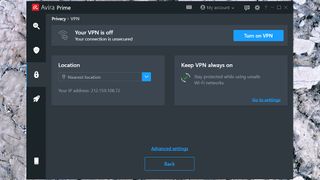
Avira Prime: Phantom VPN
Avira Prime includes the full and unrestricted version of Avira Phantom VPN, with no limits on data, features or the locations you can use.
The service is a little basic. Avira’s website talks about 157 servers in 37 countries, for instance (ExpressVPN has thousands across 105 countries.) We noticed even less, with 35 countries on most platforms and only 33 on Mac (Moldova and Slovenia weren’t available on our Mac system, for some reason.)
Apps are short on features, too. Most specialist VPNs now connect using the speedy WireGuard protocol, for example, but Avira’s Windows app restricted us to OpenVPN.

Avira Phantom VPN isn’t a bad service, though, and as part of the Avira Prime bundle, the price really is right. Sign up for NordVPN and you’ll get one of the best VPN services, but it’ll cost $68.25 in year one, $112.35 on renewal; Avira Prime gets you Phantom for a less money ($59.99, $104.99 on renewal), and gives you antivirus, privacy and performance features, too.
(If you’re short on cash then Avira Phantom VPN is included in Avira’s free suite, but with a data allowance of just 500MB a month, it’s impossible to recommend. Avast One Free is our pick of the free security suites with VPNs, thanks to its far more generous data limit of 5GB a week.)
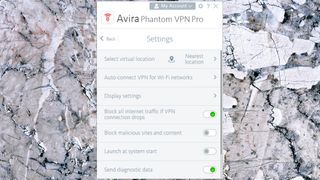
Avira Prime: VPN features
Avira’s website claims Phantom VPN has servers in only 37 countries, and our Windows app only listed 33. That’s a small network.
Using the VPN is easy, at least in Windows. Hit the big blue ‘Turn on VPN’ button when you need it, and click ‘Turn off VPN’ when you’re done.
There are some odd interface issues. A panel titled ‘Keep VPN always on’ has a ‘Go to settings’ link, but clicking that doesn’t give you an obvious ‘Always on VPN’ setting. We clicked a second link, captioned ‘Advanced settings’, which we thought might tell us more, but both links actually go to the same Settings page.
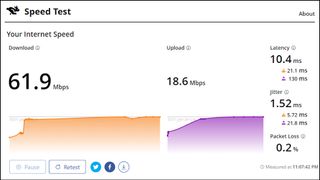
Avira Phantom VPN doesn’t have an option to change protocol; it seems to be OpenVPN only on Windows, which is secure, but not as fast as WireGuard. Our tests suggest that even by OpenVPN standards, Avira is slow, with speeds peaking at around 75Mbps; most providers manage 100-300Mbps, and the best WireGuard VPNs can reach 950Mbps+.
The Windows app does have a kill switch to block your internet connection if the VPN drops, but this gave us mixed results in testing. It correctly blocked our internet if we closed its OpenVPN app, but didn’t display a notification or try to reconnect; you’re left to figure out what’s happened on your own.
Avira scored better at unblocking, getting us into US Netflix immediately. The results were more mixed in the UK – it unblocked Netflix and Channel 4, but failed with BBC iPlayer and ITV – but that’s a fair mid-range performance overall.
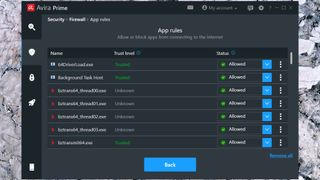
Avira Prime: Firewall
Avira’s firewall is a comprehensive network security layer which controls exactly which apps are allowed to go online, and which really aren’t.
The service works largely automatically, recognizing trusted apps and allowing them to connect to the outside world. That’s good news, because most users don’t want to be hassled by security prompts.
We first test firewalls by using Visual Studio to create and modify our own custom apps. Avira correctly recognized whenever we modified something, but it then simply asked us whether it was safe to run the app. That’s a risk, because most users simply aren’t qualified to say whether a changed app file is perfectly normal (a recent update) or very suspicious (a malware infection.)
Avast takes arguably a better approach by automatically scanning changed files for threats when they’re launched. The bad news is you might have to wait for 15-30 seconds for the scan to complete before a changed app is allowed to launch. But the good news is the decision about approving an app is taken by the antivirus, based on real and well-thought-out rules, and not an impatient user who just wants this annoying antivirus alert to disappear so they can get on with their day.
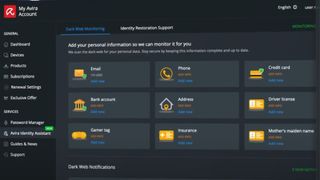
Avira Prime: Identity Assistant
Avira’s Identity Assistant is a service which monitors the dark web and raises an alert if your details appear in a data breach.
Identity Assistant is accessed from your My Avira dashboard, where a video and short FAQ make it sound like a very complete system which can look out for all kinds of details: email addresses, bank accounts, phone numbers, credit card details, mother’s maiden name, and more.
Unfortunately, all we could actually enter at the site was a single email address. You can already do that for free at haveibeenpwned.com (which is the data breach source used by many security vendors, anyway), and other providers deliver more. Avast One allows users to specify up to five email addresses, for instance, while Norton’s dark web monitoring goes beyond email to check credit card details, phone numbers and much more.
We’re still happy to see the feature included, but it doesn’t add a lot of value to the suite, and we’re definitely not impressed by the confusing website text and video.
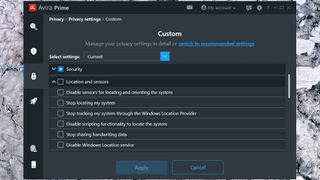
Avira Prime: Privacy
Avira’s Privacy Settings (the current incarnation of its old Privacy Pal app) is an easy-to-use tool for locking down a bunch of app and Windows privacy options.
By default, for instance, apps might be recording your location, or logging all kinds of activities to display more personalized ads, then sending various details back to Microsoft.
You can disable most of this, at least in theory, but the problem is the various settings are scattered in all kinds of obscure Windows corners. And that’s where Avira comes in. We launched Privacy Settings, clicked Recommended to choose the optimal settings, then clicked Apply, and Avira flipped all the relevant Windows privacy switches for us: much easier.
This type of tool can often go too far, disabling so many Windows features that it begins to cause usability issues. Fortunately, Avira’s recommended settings seem well chosen and unlikely to cause any problems.
If it does break something, though, Privacy Settings can restore the default settings with a click. Experts can even inspect Privacy Settings various options manually, and enable or disable whatever they like.
Using Privacy Settings does involve a degree of risk, and it’s not a tool we would recommend for casual users. But if you’re technically experienced, or just looking to maximize your PC privacy, it’s well worth a look, and we’re glad Privacy Settings is included in the package.
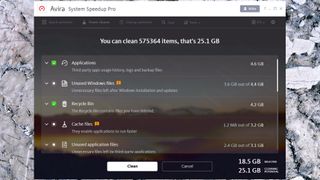
Avira Prime: System Speedup
Avira System Speedup is a powerhouse suite of Windows cleanup and maintenance tools which comes stuffed with expert-level ways to optimize your system.
Avira’s Power Cleaner, for example, crawled all over our test laptop looking for leftover files which we could delete, helping us free up a chunky 18.5GB of storage.
To put that in perspective, Avast’s excellent CCleaner is one of the best cleanup tools around, but even it could only find 5.88GB of files to delete on the same system. That’s less than a third of Avira’s total.
Avira’s success is partly down to its aggressive algorithms. It deletes every spare byte it can, and this gave us various small issues afterwards (one Steam game lost some of its settings, one Visual Studio project also required setting up again.)
Power Cleaner isn’t a tool we’d recommend to Windows newbies, then, but it’s a different story for power users. The tool didn’t cause any major problems, and if you do find Avira causes issues with a particular app, then you can configure Power Cleaner to ignore it in future.
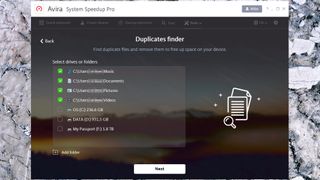
Avira Prime: Free Up Space
Avira’s automated disk cleanup is hugely impressive, but it’s also just the start of what System Speedup has to offer. The app also provides a bunch of extra tools to help you manually explore what’s taking up your storage space, and remove anything you don’t need.
There are modules to find large files and folders, for instance. In a click or two we uncovered 6GB of unnecessary large files, including an old archived Outlook PST file and a bunch of ancient videos from a long-lost mobile phone.
A Duplicate File Finder helped us find more files that we had copied around our hard drive, then forgotten about the originals. Deciding which to keep and which (if any) to delete takes time and thought, but with almost 20GB of duplicates on our test laptop, it was well worth the effort.
Software Uninstaller is an advanced version of the Windows Control Panel uninstaller which gives you multiple ways to inspect your system. We were able to review recently-installed apps; the apps that took the most space; Windows Store apps, Windows updates, system components and more.
The tool only uses the regular app uninstallers, and doesn’t try to remove any leftovers itself. It’s also a little risky to use, if you’re not careful; uninstall the wrong system component and who knows what you could break. But you don’t have to use Software Uninstaller if you’re worried, and on balance we’re glad it’s included with the app.
Avira Prime: Startup Optimizer
Avira Startup Optimizer aims to cut Windows boot times by delaying (or preventing) the launch of apps, services and Windows components you may not need.
This can be risky; if the optimizer prevents something loading which is actually really important, then it might break an app or even stop your device starting properly.
The system works largely automatically. We tapped an Analyze button, it found 100+ startup items within seconds and decided what to do with them. We accepted the default settings and restarted to check the results.
The first restart was disappointing, with Avira reporting a boot time that had actually lengthened by six seconds (from 53 to 59.) We looked at the settings for an explanation, found nothing, rebooted again, and this time our boot plummeted to 33 seconds.
This kind of tool always has some risks, and might prevent apps or even your PC from loading properly if they make a mistake. But if you’re happy you can recover from most situations – you’re familiar with Safe Mode and System Restore, say – then Avira Startup Optimizer is certainly worth a try.
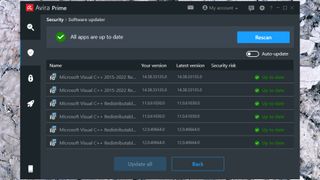
Avira Prime: Software Updater
Avira Software attempts to improve your device security by identifying, downloading and installing any missing app security patches.
Avira says the service only supports 150+ apps, a relatively small number: Microsoft Office, Adobe apps, browsers, media players and so on. Software Updater has been around for a very long time, though, and in our experience it does a very good job of keeping a system patched.
If you’re keen on this type of feature, Norton Software Updater is one of our favorites. It identified 11 missing updates in our last Norton review, as many as we’d expect from specialist update-checking tools.
Keep in mind, though, that many software updaters are available in a free form, allowing you to sample them before you buy. Avira Software Updater Free is available on the Avira site, and there are some excellent free specialist tools in Home Updater, and WingetUI.
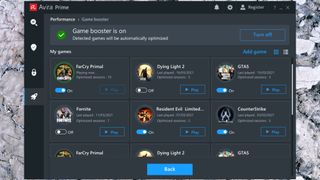
Avira Prime: Game Booster
Avira’s Game Booster is a handy automatic speed-boosting technology which the company acquired when it purchased BullGuard back in 2021.
Game Booster works by temporarily switching your power plan to the most performance-friendly option, while also optimizing all running processes to give your game a greater share of system resources.
There is no guarantee Game Booster will offer measurable benefits, but, unlike some so-called Windows speedup tricks (hello, Registry cleaning) it’s based on very sound principles. And it’s been shown to be effective. Although Avira hasn’t talked about the technology much, BullGuard got an independent company to test Game Booster when it first appeared, and it did achieve some very worthwhile results.
The good news is you don’t have to do anything to try the system out. Game Booster automatically detects and optimizes full-screen games as they’re run. Best case, speeds improve; likely worst case, you don’t notice any difference, and carry on as before.
Overall, Game Booster is another reminder that Avira is serious about its performance-boosting aspirations. Unlike many competitors, it doesn’t pretend that clearing your internet history and emptying the Recycle bin will have some magical effect: Avira uses all kinds of tools to help your system deliver extra speed when you need it.

Avira Prime: Support
Avira’s support service begins with its web knowledgebase. Although this has some useful content, there’s less than we would expect, and the articles you get are often dated and lacking depth (tutorials often don’t have screenshots, for instance.)
Some features aren’t covered at all. We searched for Game Booster, for example, and didn’t get a single hit. That’s disappointing; if Avira can’t come up with decent troubleshooting guides, we at least expect articles explaining what each feature does and how they work.
Paying customers can avoid these hassles and contact support directly. Live chat is the easiest option, and phone support is available Monday-Friday from 9am-11pm CET.
We contacted support via email with a tricky VPN connection issue. This was a complicated problem which would have stretched even the best VPN providers, but we were still surprised at Avira’s poor performance.
After sending an in-depth description of the problem, for example, we had to wait six days for a reply. Later, when he had run out of ideas, the agent explained that he had escalated our case to a ‘higher level’ team; sounded good, but three weeks have gone by as we write, and we’ve still not had a response.
For contrast, we tried something similar with Norton’s live chat. The agent opened a remote support session with us and spent 30 minutes trying everything he knew. He also said he would escalate our query, but this would only take 2-3 days, and the agent would even call us at our preferred time (approximately.) Support actually got back to us the next day, and this time fixed the problem.
We’ve had far more prompt and reliable support from Avira in the past, but we’ve not tested the company with VPN queries before; maybe it’s short of agents with the relevant expertise. Specialist VPN providers answer most questions in hours, though, not days (or weeks), and if Avira wants Phantom VPN to become a genuine alternative to the big industry names then it needs to do the same.
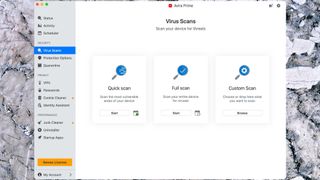
Avira Prime: Avira Prime for Mac
Avira Prime for Mac is a decent mid-range security suite offering antivirus, web protection, the full Avira Phantom VPN, data breach monitoring via Identity Assistant, and performance options to delete junk files, uninstall unwanted apps and control your startup software.
A straightforward interface makes this all very easy to operate. Most key functions are listed on a left-hand sidebar, and clicking something like Virus Scans takes you to a page with the relevant options (Quick, Full and Custom scans.)
(There are a few exceptions – the VPN and Password Manager options just have a button to open a separate app – but we soon found our way around.)
Malware protection is a little disappointing. AV-Comparatives gave Avira a protection rate of 99% in its last Mac test, placing the company last out of nine contenders. (Bitdefender managed 99.7%, Avast a perfect 100%.)
Results can sometimes vary between testing labs, so we were keen to check AV-Test’s latest report. But that was surprisingly similar, placing Avira last out of eight antivirus apps.
The other app features are acceptable, though not outstanding in any way. Avira Phantom VPN is secure but short on features (and has two countries less than the Windows edition); the simple password manager gets the job done, but can’t begin to match top competitors such as Dashlane; and although the performance tools are useful, they’re far behind the tools available on Windows.
Overall, Avira Prime for Mac isn’t a bad security app, but it’s not a great one, either. If you’re not committed to Avira,. Bitdefender offers better protection and extras such as webcam protection, while Norton includes cloud backup and a firewall.
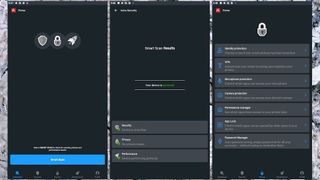
Avira Prime: Avira Prime for Android
Avira Antivirus Security and VPN for Android has a decent free version with some useful features: basic antivirus, a limited 500MB a month VPN, data breach monitoring, device cleanup to find and delete junk files, and an app locker to prevent others running sensitive apps unless they know the PIN.
Signing up for Prime delivers a much better version, though. The antivirus gets more frequent updates for improved protection; Safe Browsing keeps you safe from phishing and other malicious sites; you can use the full unlimited Avira Phantom VPN app; Camera and Microphone protection stops apps spying on you without your knowledge, Avira’s Password Manager automates your logins, and you get access to customer support if you’ve any questions.
The app got off to a good start. We didn’t have to create an account, hand over our email address or provide any personal details at all to try the free version. And if you’d bought the paid version, the app’s opening Profile screen displays Cancel, Refund and Renewal settings right at the top of the screen, a refreshing change from providers who bury them deep in the menu system.
The app does a fair job of the security basics. The app and web protection automatically protected us from threats; the VPN connected quickly when we needed it, and a straightforward interface ensures most features are no more than a couple of taps away.
Avira Antivirus Security and VPN doesn’t excel in any area, either, but it’s generally good enough. It was behind Avast in AV-Comparatives’ last mobile test, for instance, but only by the smallest margins: both apps blocked 100% of test threats, but Avira had one more false positive (3 vs. 2.)
Put it all together and Avira’s Android offering has plenty to offer everyone. Casual users get a decent app that will keep them safe, while also staying in the background and causing as little day-to-day hassle as possible. And experts get plenty of security features to play with, allowing them to lock down their device for the maximum possible privacy.
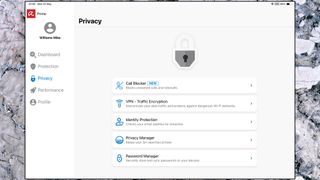
Avira Prime: Avira Prime for iOS
IOS security apps are generally light on features, and Avira Security is no exception. Only web protection, data breach monitoring, the password manager and VPN have made it from the Windows edition across to your iDevice.
There’s still some value in these, of course, and just being able to share passwords or connect to a secure VPN with a tap are benefits worth having.
Avira has padded out its feature set with a handful of smaller iOS-specific options, but they’re generally very basic. For example, an iOS updater checked for, well, iOS updates, something our iPad was perfectly capable of doing on its own. Another option allowed us to back up our contacts to email or our own Dropbox account, but again, iPhones give you better backup features and your own iCloud storage space for free.
There are a couple of worthwhile exceptions. The call blocker could be handy, for instance, and the Photo Cleaner helped us free up more storage than expected by identifying duplicate and similar photos. But otherwise Avira Prime seems a little underpowered, even by iOS standards, and a distinct lack of updates – just two bug fix releases in the last two years – suggests Avira isn’t very interested in taking the app significantly further.
Avira Prime: Final verdict
Avira Prime is a likeable security suite with a lot of features which does an above average job of keeping you safe. If you’re an Avira fan, maybe because you use the free version, it could be a sensible choice.
Prime hasn’t changed much in the past few years, though, and it now can’t quite match the top competition. Norton 360 Deluxe has major new features for less money, for example, while Bitdefender includes more capable tools and higher rated protection.
